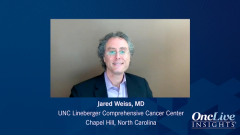
Chemo-Induced Myelosuppression in ES-SCLC
Types of chemotherapy-induced myelosuppression that typically occur in patients with extensive-stage small cell lung cancer and considerations for treating patients based on risk factors and presentation of adverse events.
Episodes in this series

Jared Weiss, MD: There are 3 major types of myelosuppression and they are far more common than most doctors realize. We take them for granted because they’ve been the cost of doing business with cytotoxic [agents] for small cell [lung cancer], if not all cancer, for decades. And until recently there wasn’t much we could do about it. The first is neutropenia, which is the most common on doctors’ minds. Neutrophils are the Marines of the immune system; they’re first on the scene to fight infection. And grade 3/4 neutropenia occurs in about 54% of patients. Anemia is low hemoglobin or low oxygen-carrying capacity in the blood, and at a high grade that occurs in about 31% of patients with small cell chemotherapy. Patients will feel tired or short of breath. With thrombocytopenia, these are cells involved in clotting in the early stages of platelet formation; they are the platelets. And in grade 3 or 4, this occurs in 54% of patients.
Charu Aggarwal, MD, MPH: There are several factors that may make my patients with small cell lung cancer more likely to experience myelosuppression with the use of chemotherapy-based regimens. And I always make it a point to evaluate for that in the context of which regimen I’m providing and how I can best support my patients and reduce the risks. There are several patient-related factors that may increase the risk above and beyond the chemotherapy regimen itself. In general, when I look at chemotherapy regimens, I look at the overall risk of febrile neutropenia, and there are some regimens that have a very high risk, more than 20%; some that have an intermediate risk of febrile neutropenia, about 10% to 20%; and some that have a low risk, less than 10%.
Among regimens that have a very high risk of febrile neutropenia, I do use growth factor support to help my patients receive cycle 2 or subsequent cycles on time and without any significant dose reduction. However, for intermediate risk of febrile neutropenia, there are certain patient risk factors that we must consider to determine and make a decision about whether to use growth factor support preemptively or to add it later. Some of these risk factors are prior receipt of chemotherapy or radiation. Has there been persistent neutropenia in the past? Is there any bone marrow involvement by metastatic disease or by the tumor? Is there liver dysfunction with a bilirubin of greater than 2 [mg/dL]? Are there creatinine clearance issues? Is there kidney dysfunction? And then anyone above the age of 65 is high risk. If I see more than or equal to 1 risk factor, I do often prescribe preemptive or prophylactic growth factor support for my patients in an attempt to support them and avoid dose reductions.
What is it about myelosuppression that’s particularly concerning? There are 2 things that are concerning about myelosuppression. First is neutropenia. I worry about the risk of infection, the risk of febrile neutropenia, and the risk of opportunistic infections in our already immunocompromised patients receiving high-dose chemotherapy or chemotherapeutic regimens that are highly myelosuppressive. That’s one aspect, and the other aspect is that we’re not just looking at white [blood cell] counts. We’re also looking at myelosuppression when it comes to the other 2 lines, that is anemia and presence of thrombocytopenia. I do worry about fatigue. I worry about easy bruising. I worry about bleeding. And all of these issues can directly impact quality of life, they can impact what patients are or are not able to do. In the spirit of providing the best supportive care, we want to be able to support patients even through myelosuppressive chemotherapy. The answer should be it’s not just neutropenia alone.
Transcript edited for clarity.


































